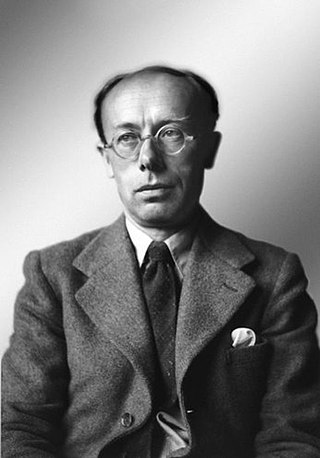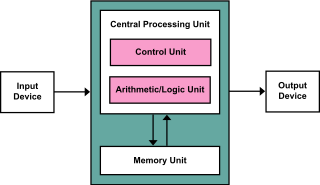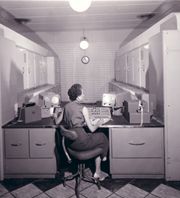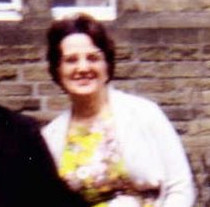Related Research Articles

In mathematics and computer science, an algorithm is a finite sequence of rigorous instructions, typically used to solve a class of specific problems or to perform a computation. Algorithms are used as specifications for performing calculations and data processing. More advanced algorithms can use conditionals to divert the code execution through various routes and deduce valid inferences, achieving automation eventually. Using human characteristics as descriptors of machines in metaphorical ways was already practiced by Alan Turing with terms such as "memory", "search" and "stimulus".

Alan Mathison Turing was an English mathematician, computer scientist, logician, cryptanalyst, philosopher and theoretical biologist. Turing was highly influential in the development of theoretical computer science, providing a formalisation of the concepts of algorithm and computation with the Turing machine, which can be considered a model of a general-purpose computer. He is widely considered to be the father of theoretical computer science and artificial intelligence.
In computability theory, the Church–Turing thesis is a thesis about the nature of computable functions. It states that a function on the natural numbers can be calculated by an effective method if and only if it is computable by a Turing machine. The thesis is named after American mathematician Alonzo Church and the British mathematician Alan Turing. Before the precise definition of computable function, mathematicians often used the informal term effectively calculable to describe functions that are computable by paper-and-pencil methods. In the 1930s, several independent attempts were made to formalize the notion of computability:

The history of computing hardware covers the developments from early simple devices to aid calculation to modern day computers.

Maxwell Herman Alexander Newman, FRS,, generally known as Max Newman, was a British mathematician and codebreaker. His work in World War II led to the construction of Colossus, the world's first operational, programmable electronic computer, and he established the Royal Society Computing Machine Laboratory at the University of Manchester, which produced the world's first working, stored-program electronic computer in 1948, the Manchester Baby.
In computability theory, a system of data-manipulation rules is said to be Turing-complete or computationally universal if it can be used to simulate any Turing machine. This means that this system is able to recognize or decide other data-manipulation rule sets. Turing completeness is used as a way to express the power of such a data-manipulation rule set. Virtually all programming languages today are Turing-complete.

The von Neumann architecture—also known as the von Neumann model or Princeton architecture—is a computer architecture based on a 1945 description by John von Neumann, and by others, in the First Draft of a Report on the EDVAC. The document describes a design architecture for an electronic digital computer with these components:

The Manchester Baby, also called the Small-Scale Experimental Machine (SSEM), was the first electronic stored-program computer. It was built at the University of Manchester by Frederic C. Williams, Tom Kilburn, and Geoff Tootill, and ran its first program on 21 June 1948.

The Ferranti Mark 1, also known as the Manchester Electronic Computer in its sales literature, and thus sometimes called the Manchester Ferranti, was produced by British electrical engineering firm Ferranti Ltd. It was the world's first commercially available electronic general-purpose stored program digital computer.

Christopher S. Strachey was a British computer scientist. He was one of the founders of denotational semantics, and a pioneer in programming language design and computer time-sharing. He has also been credited as possibly being the first developer of a video game. He was a member of the Strachey family, prominent in government, arts, administration, and academia.

ReserVec was a computerized reservation system developed by Ferranti Canada for Trans-Canada Airlines in the late 1950s. It appears to be the first such system ever developed, predating the more famous SABRE system in the United States by about two years. Although Ferranti had high hopes that the system would be used by other airlines, no further sales were forthcoming and development of the system ended. Major portions of the transistor-based circuit design were put to good use in the Ferranti-Packard 6000 computer, which would later go on to see major sales in Europe as the ICT 1904.

Conway Maurice Berners-Lee was an English mathematician and computer scientist who worked as a member of the team that developed the Ferranti Mark 1, the world's first commercial stored program electronic computer. He was born in Birmingham in 1921 and was the father of Sir Tim Berners-Lee, the inventor of the World Wide Web, and Professor Mike Berners-Lee, researcher into climate change.

Mary Lee Berners-Lee was an English mathematician and computer scientist who worked in a team that developed programs in the Department of Computer Science, University of Manchester Mark 1, Ferranti Mark 1 and Mark 1 Star computers. She was the mother of Sir Tim Berners-Lee, the inventor of the World Wide Web, and Mike Berners-Lee, an English researcher and writer on greenhouse gases.

The history of computer science began long before the modern discipline of computer science, usually appearing in forms like mathematics or physics. Developments in previous centuries alluded to the discipline that we now know as computer science. This progression, from mechanical inventions and mathematical theories towards modern computer concepts and machines, led to the development of a major academic field, massive technological advancement across the Western world, and the basis of a massive worldwide trade and culture.

A computer is a machine that can be programmed to automatically carry out sequences of arithmetic or logical operations (computation). Modern digital electronic computers can perform generic sets of operations known as programs. These programs enable computers to perform a wide range of tasks. The term computer system may refer to a nominally complete computer that includes the hardware, operating system, software, and peripheral equipment needed and used for full operation; or to a group of computers that are linked and function together, such as a computer network or computer cluster.

The Manchester Mark 1 was one of the earliest stored-program computers, developed at the Victoria University of Manchester, England from the Manchester Baby. Work began in August 1948, and the first version was operational by April 1949; a program written to search for Mersenne primes ran error-free for nine hours on the night of 16/17 June 1949.
Beatrice Helen Worsley was the first female Canadian computer scientist. She received her Ph.D. degree from the University of Cambridge with Maurice Wilkes as adviser, the first Ph.D. granted in what would today be known as computer science. She wrote the first program to run on EDSAC, co-wrote the first compiler for Toronto's Ferranti Mark 1, wrote numerous papers in computer science, and taught computers and engineering at Queen's University and the University of Toronto for over 20 years before her death at the age of 50.
Dietrich Gunther Prinz was a computer science pioneer, notable for his work on early British computers at Ferranti, and in particular for developing the first limited chess program in 1951.

Turochamp is a chess program developed by Alan Turing and David Champernowne in 1948. It was created as part of research by the pair into computer science and machine learning. Turochamp is capable of playing an entire chess game against a human player at a low level of play by calculating all potential moves and all potential player moves in response, as well as some further moves it deems considerable. It then assigns point values to each game state, and selects the move resulting in the highest point value.

Cicely Mary Williams was a British software engineer who worked with Alan Turing on the Manchester Mark 1 computer.
References
- 1 2 "Birth and death dates for Marjorie Audrey Bates/Wallis". ancestry.co.uk.
- 1 2 3 4 Swinton, Jonathan (2019). Alan Turing's Manchester. Manchester: Manchester: Infang Publishing. pp. p119. ISBN 978-0-9931789-2-4.
- 1 2 Andrew, Hodges (2014). The Alan Turing : the enigma. London. ISBN 9781784700089. OCLC 890394618.
{{cite book}}: CS1 maint: location missing publisher (link) - ↑ Bates, Audrey (1950). The mechanical solution of a problem in Church's Lambda calculus (Thesis). University of Manchester.
- ↑ Bowdon (1953). Faster Than Thought. Pitman.
- ↑ Pedwell, Susan (2013). "Paving the Way for the Information Highway".
- 1 2 "Women at the console". Alan Turing's Manchester. Retrieved 2021-01-18.
- ↑ "DTIC ADA083756: An Assessment of the Influence of Emerging Social and Economic Trends on the People and Management of the Coast Guard. Volume II". December 1979.
- ↑ Lavington, Simon, Stardust: tales from the early days of computing. Talk to the Computer Conservation Society, Manchester, 19 February 2019.